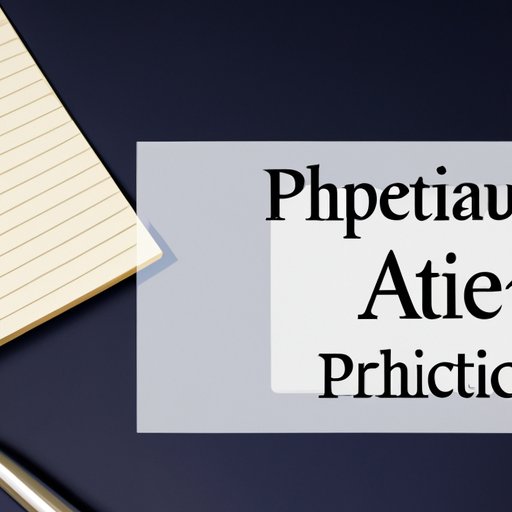
I. Introduction
Citing a lecture is an important component of academic writing. Proper citation gives credit to the original source and supports the writer’s claims. Citing a lecture correctly can be a challenging task and many students and writers struggle with it. This article provides a comprehensive guide on how to cite a lecture for different scenarios and includes tips and common mistakes to avoid.
II. Step-by-Step Guide for Citing a Lecture
There are various scenarios when it comes to citing a lecture, such as when the lecturer is the author, when the lecture was found online, or when the lecture was attended in-person. Here is a step-by-step guide on how to cite a lecture in different scenarios:
Citing a Lecture When the Lecturer is the Author
- Begin with the lecturer’s last name, followed by a comma and the first initial. For instance, if the lecturer’s name is Jane Smith, the citation should begin as follows: Smith, J.
- Include the date the lecture was given in parentheses. For example, (2017, April 14).
- Add the title of the lecture in sentence-case capitalization. For instance, If the lecture was titled “Introduction to Quantum Physics,” the citation should include a comma after the date and then the lecture title in sentence-case capitalization.
- Enter the place where the lecture took place. For example, if the lecture took place at the University of Florida in Gainesville, enter it as follows: Lecture presented at the University of Florida, Gainesville.
Citing a Lecture Found Online
- Begin the citation with the lecturer’s last name, followed by a comma and the first initial.
- Add the date the lecture was given in parentheses.
- Include the title of the lecture in sentence-case capitalization.
- Add the name of the course or event where the lecture was delivered. Italicize the course or event name.
- Add the institution or organization hosting the course or event.
- Add the URL of the lecture.
Citing a Lecture Attended In-Person
- Begin the citation with the lecturer’s last name, followed by a comma and the first initial.
- Add the date the lecture was given in parentheses.
- Include the title of the lecture in sentence-case capitalization.
- Add the name of the course or event where the lecture was delivered. Italicize the course or event name.
- Add the institution or organization hosting the course or event.
- Include the location of the lecture.
III. Differences between Citing a Lecture and Citing Other Sources
It is important to note that there are some differences between citing a lecture and citing other types of sources. Unlike citing a book or journal article, citing a lecture requires specifying the name of the course or event and the organization hosting it. It is also essential to include the date the lecture was given. When citing lectures in text, use the surname of the lecturer and the year the lecture was given. Additionally, include the page number if quoting directly from the lecture.
IV. Tips for Citing Guest Lectures
Guest lectures can be a bit tricky to cite as the presenter may not have published research or works. To fill any information gaps, trace the lecturer’s research and publications listed on their professional website. If this information is not available, it is acceptable to omit it from the citation. However, it is still important to include the lecturer’s full name, the title of their lecture, the event or course name, and the date it was presented.
V. Common Mistakes When Citing a Lecture
Students and writers may make common mistakes when citing a lecture which can compromise the credibility of their work. One of the most common mistakes is not providing enough detail in the citation. It is important to include the lecturer’s full name, the title of their lecture, the course or event name, the date the lecture was presented, and organization hosting it.
Another common mistake is not formatting the lecture citation correctly in the reference list. Ensure that the citation is formatted based on the citation style recommended by your institution or publisher. Always double-check the citation for accuracy and completeness.
VI. Citing Lectures in APA Format
The American Psychological Association (APA) has specific guidelines for citing lectures. Here is a step-by-step guide on how to cite a lecture in APA format:
Citing a Lecture When the Lecturer is the Author
Smith, J. (2017, April 14). Introduction to Quantum Physics. Lecture presented at the University of Florida, Gainesville.
Citing a Lecture Found Online
Smith, J. (2017, April 14). Introduction to Quantum Physics [PowerPoint slides]. Presented at the Quantum Physics Conference, University of Florida, Gainesville. Retrieved from https://www.quantumphysicsconference.edu/2017/smith_presentation.pdf
Citing a Lecture Attended In-Person
Smith, J. (2017, April 14). Introduction to Quantum Physics. Lecture presented at the University of Florida, Gainesville.
VII. Citing Virtual Lectures
With the rise of online learning, virtual lectures are becoming increasingly common. To cite a virtual lecture, follow the same steps as citing an in-person lecture. Include the author’s name, date, title, course or event name, and the organization hosting the lecture. In addition, include the date the lecture was accessed and the URL.
VIII. Conclusion
Citing a lecture correctly can be daunting, but it is a crucial component of academic writing. Proper citation adds credibility to your work and gives credit to the original source. This article provided a comprehensive guide on how to cite lectures in different scenarios, including APA format. It also highlighted the differences between citing lectures and citing other sources, provided tips on how to cite guest and virtual lectures, and identified some common mistakes to avoid. Citing a lecture may seem complex at first, but this guide should help you overcome any obstacles and ensure that you are citing lectures correctly every time.





